2020中考英语 一般将来时导学案 外研版
- 格式:doc
- 大小:58.50 KB
- 文档页数:5
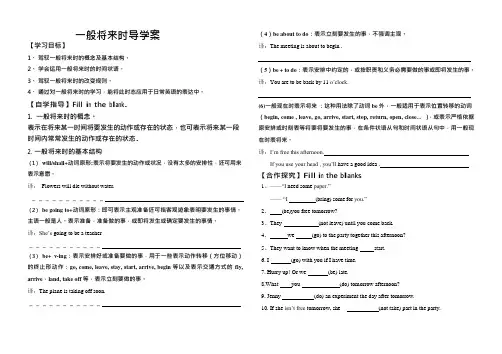
【学习目标】一般将来时导学案(4)be about to do:表示立刻要发生的事,不强调主观。
译:The meeting is about to begin .1、驾驭一般将来时的概念及基本结构。
2、学会运用一般将来时的时间状语。
3、驾驭一般将来时的改变规则。
4、通过对一般将来时的学习,能将此时态应用于日常英语的表达中。
【自学指导】Fill i n the b l a n k.1.一般将来时的概念。
表示在将来某一时间将要发生的动作或存在的状态,也可表示将来某一段时间内常常发生的动作或存在的状态.2.一般将来时的基本结构(1)will/shall+动词原形:表示将要发生的动作或状况,没有太多的安排性,还可用来表示意愿。
译:Flowers will die without water.___________(2)be going to+动词原形:即可表示主观准备还可指客观迹象表明要发生的事情。
主语一般是人。
表示准备,准备做的事,或即将发生或确定要发生的事情。
译:She’s going to be a teacher___________(3)be+ v-ing:表示安排好或准备要做的事,用于一些表示动作转移(方位移动)的终止形动作:go, come, leave, stay, start, arrive, begin 等以及表示交通方式的fly, arrive,land, take off 等,表示立刻要做的事。
译:The plane is taking off soon.___________(5)be + to do:表示安排中约定的,或按职责和义务必需要做的事或即将发生的事。
译:You are to be back by 11 o’clock.(6)一般现在时表示将来:这种用法除了动词be 外,一般适用于表示位置转移的动词(begin, come , leave, go, arrive, start, stop, return, open, close… ),或表示严格依据原安排或时刻表等将要将要发生的事,在条件状语从句和时间状语从句中,用一般现在时表将来。
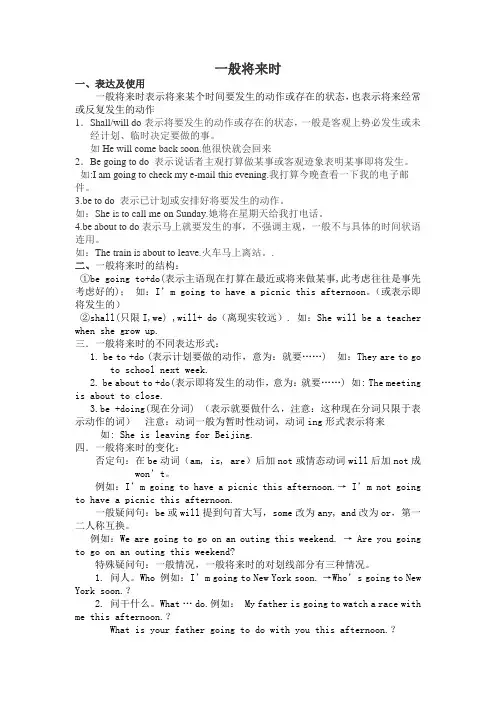
一般将来时一、表达及使用一般将来时表示将来某个时间要发生的动作或存在的状态,也表示将来经常或反复发生的动作1.Shall/will do表示将要发生的动作或存在的状态,一般是客观上势必发生或未经计划、临时决定要做的事。
如He will come back soon.他很快就会回来2.Be going to do 表示说话者主观打算做某事或客观迹象表明某事即将发生。
如:I am going to check my e-mail this evening.我打算今晚查看一下我的电子邮件。
3.be to do 表示已计划或安排好将要发生的动作。
如:She is to call me on Sunday.她将在星期天给我打电话。
4.be about to do表示马上就要发生的事,不强调主观,一般不与具体的时间状语连用。
如:The train is about to leave.火车马上离站。
.二、一般将来时的结构:①be going to+do(表示主语现在打算在最近或将来做某事,此考虑往往是事先考虑好的);如:I’m going to have a picnic this a fternoon。
(或表示即将发生的)②shall(只限I,we) ,will+ do(离现实较远). 如:She will be a teacher when she grow up.三.一般将来时的不同表达形式:1. be to +do (表示计划要做的动作,意为:就要……) 如:They are to goto school next week.2. be about to +do(表示即将发生的动作,意为:就要……) 如: The meeting is about to close.3.be +doing(现在分词) (表示就要做什么,注意:这种现在分词只限于表示动作的词)注意:动词一般为暂时性动词,动词ing形式表示将来如: She is leaving for Beijing.四.一般将来时的变化:否定句:在be动词(am, is, are)后加not或情态动词will后加not成won’t。
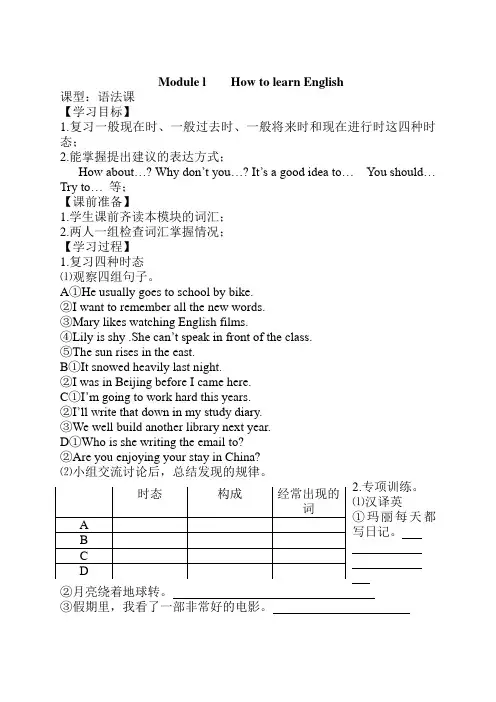
Module l How to learn English课型:语法课【学习目标】1.复习一般现在时、一般过去时、一般将来时和现在进行时这四种时态;2.能掌握提出建议的表达方式;How about…? Why don‘t you…? It‘s a good idea to… You should… Try to… 等;【课前准备】1.学生课前齐读本模块的词汇;2.两人一组检查词汇掌握情况;【学习过程】1.复习四种时态⑪观察四组句子。
A①He usually goes to school by bike.②I want to remember all the new words.③Mary likes watching English films.④Lily is shy .She can‘t speak in front of the class.⑤The sun rises in the east.B①It snowed heavily last night.②I was in Beijing before I came here.C①I‘m goin g to work hard this years.②I‘ll write that down in my study diary.③We well build another library next year.D①Who is she writing the email to?②Are you enjoying your stay in China?⑫小组交流讨论后,总结发现的规律。
2.专项训练。
Array⑪汉译英①玛丽每天都写日记。
②月亮绕着地球转。
③假期里,我看了一部非常好的电影。
④明天我去找你谈谈有关新计划的事。
⑤莉莉正在愉快地唱歌。
⑫小组交流,使用不同的时态描述暑假活动、新学期打算等等。
3.展示新知识⑪小组讨论总结表示提建议的日常用语。
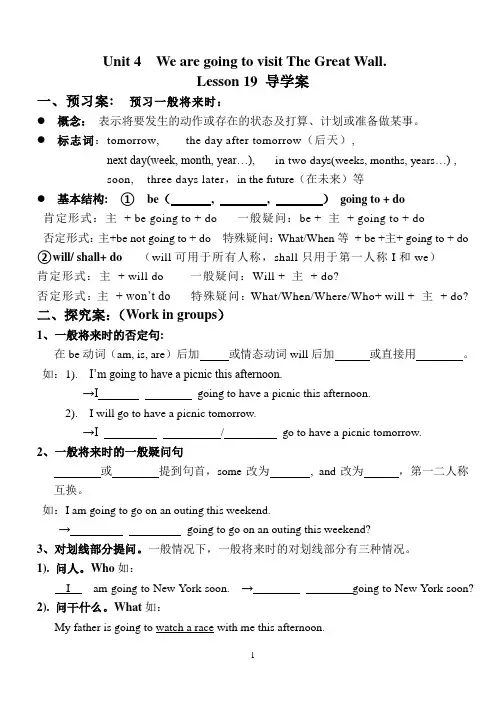
Unit 4 We are going to visit The Great Wall.Lesson 19 导学案一、预习案: 预习一般将来时:●概念:表示将要发生的动作或存在的状态及打算、计划或准备做某事。
●标志词:tomorrow, the day after tomorrow(后天),next day(week, month, year…),in two days(weeks, months, years…) ,soon, three days later,in the future(在未来)等●基本结构: ①be(, , )going to + do肯定形式:主+ be going to + do 一般疑问:be + 主+ going to + do否定形式:主+be not going to + do 特殊疑问:What/When等+ be +主+ going to + do ②will/ shall+ do (will可用于所有人称,shall只用于第一人称I和we)肯定形式:主+ will do 一般疑问:Will + 主+ do?否定形式:主+ won’t do 特殊疑问:What/When/Where/Who+ will + 主+ do?二、探究案:(Work in groups)1、一般将来时的否定句:在be动词(am, is, are)后加或情态动词will后加或直接用。
如:1). I’m going to have a picnic this afternoon.→I going to have a picnic this afternoon.2). I will go to have a picnic tomorrow.→I / go to have a picnic tomorrow.2、一般将来时的一般疑问句或提到句首,some改为, and改为,第一二人称互换。
如:I am going to go on an outing this weekend.→going to go on an outing this weekend?3、对划线部分提问。
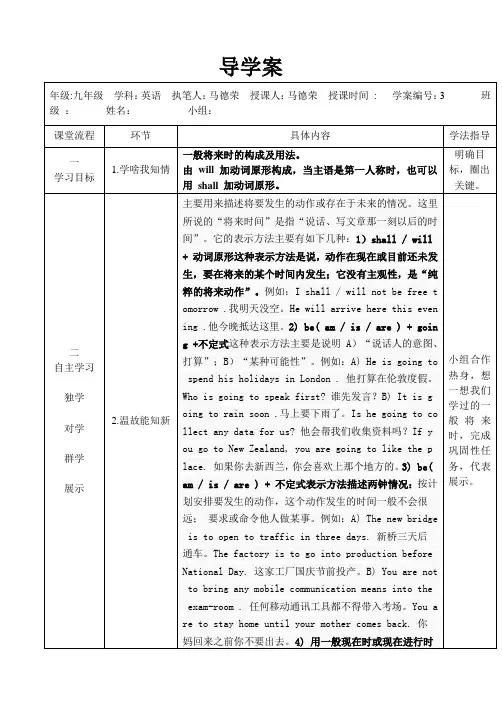
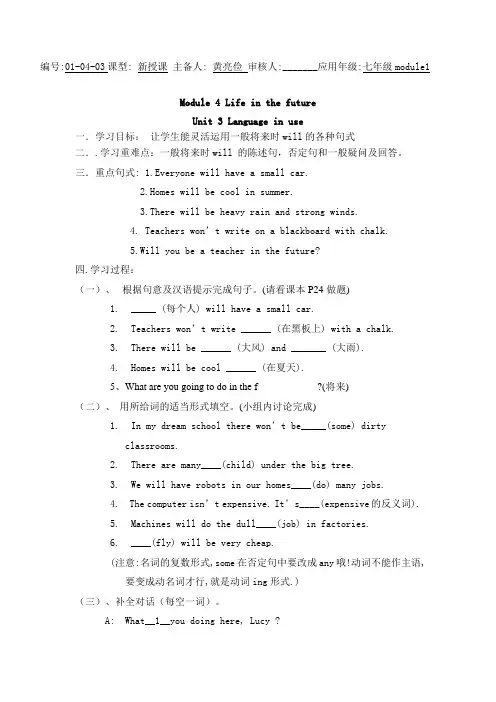
编号:01-04-03课型: 新授课主备人: 黄亮俭审核人:_______应用年级:七年级module1Module 4 Life in the futureUnit 3 Language in use一.学习目标:让学生能灵活运用一般将来时will的各种句式二..学习重难点:一般将来时will 的陈述句,否定句和一般疑问及回答。
三.重点句式: 1.Everyone will have a small car.2.Homes will be cool in summer.3.There will be heavy rain and strong winds.4. Teachers won’t write on a blackboard with chalk.5.Will you be a teacher in the future?四.学习过程:(一)、根据句意及汉语提示完成句子。
(请看课本P24做题)1._____ (每个人) will have a small car.2.Teachers won’t write ______ (在黑板上) with a chalk.3.There will be ______ (大风) and _______ (大雨).4.Homes will be cool ______ (在夏天).5、What are you going to do in the f____________?(将来)(二)、用所给词的适当形式填空。
(小组内讨论完成)1.In my dream school there won’t be_____(some) dirtyclassrooms.2.There are many____(child) under the big tree.3.We will have robots in our homes____(do) many jobs.4.The computer isn’t expensive. It’s____(expensive的反义词).5.Machines will do the dull____(job) in factories.6.____(fly) will be very cheap.(注意:名词的复数形式,some在否定句中要改成any哦!动词不能作主语,要变成动名词才行,就是动词ing形式.)(三)、补全对话(每空一词)。
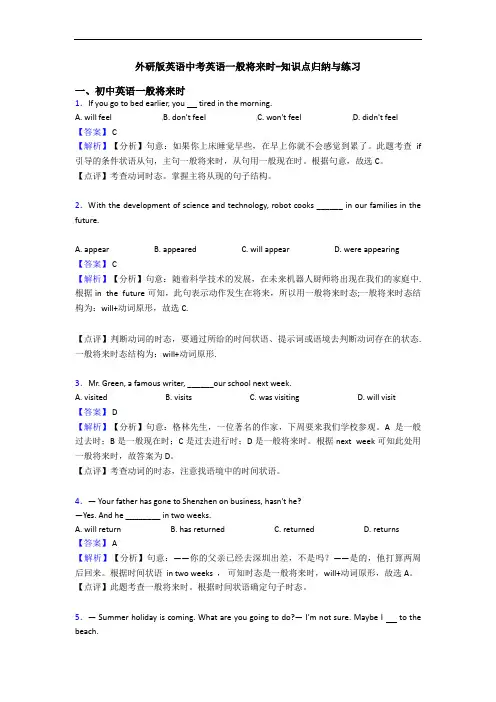
外研版英语中考英语一般将来时-知识点归纳与练习一、初中英语一般将来时1.If you go to bed earlier, you tired in the morning.A. will feelB. don't feelC. won't feelD. didn't feel【答案】 C【解析】【分析】句意:如果你上床睡觉早些,在早上你就不会感觉到累了。
此题考查if 引导的条件状语从句,主句一般将来时,从句用一般现在时。
根据句意,故选C。
【点评】考查动词时态。
掌握主将从现的句子结构。
2.With the development of science and technology, robot cooks ______ in our families in the future.A. appearB. appearedC. will appearD. were appearing【答案】 C【解析】【分析】句意:随着科学技术的发展,在未来机器人厨师将出现在我们的家庭中. 根据in the future可知,此句表示动作发生在将来,所以用一般将来时态;一般将来时态结构为:will+动词原形,故选C.【点评】判断动词的时态,要通过所给的时间状语、提示词或语境去判断动词存在的状态. 一般将来时态结构为:will+动词原形.3.Mr. Green, a famous writer, ______our school next week.A. visitedB. visitsC. was visitingD. will visit【答案】 D【解析】【分析】句意:格林先生,一位著名的作家,下周要来我们学校参观。
A是一般过去时;B是一般现在时;C是过去进行时;D是一般将来时。
根据next week可知此处用一般将来时,故答案为D。
【点评】考查动词的时态,注意找语境中的时间状语。
4.— Your father has gone to Shenzhen on business, hasn't he?—Yes. And he ________ in two weeks.A. will returnB. has returnedC. returnedD. returns【答案】 A【解析】【分析】句意:——你的父亲已经去深圳出差,不是吗?——是的,他打算两周后回来。
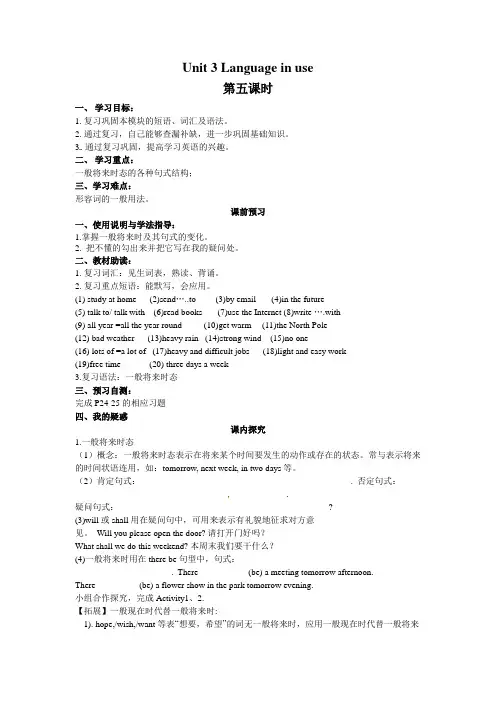
Unit 3 Language in use第五课时一、学习目标:1. 复习巩固本模块的短语、词汇及语法。
2. 通过复习,自己能够查漏补缺,进一步巩固基础知识。
3. 通过复习巩固,提高学习英语的兴趣。
二、学习重点:一般将来时态的各种句式结构;三、学习难点:形容词的一般用法。
课前预习一、使用说明与学法指导:1.掌握一般将来时及其句式的变化。
2. 把不懂的勾出来并把它写在我的疑问处。
二、教材助读:1. 复习词汇:见生词表,熟读、背诵。
2. 复习重点短语:能默写,会应用。
(1) study at home (2)send…..to (3)by email (4)in the future(5) talk to/ talk with (6)read books (7)use the Internet (8)write ….with(9) all year =all the year round (10)get warm (11)the North Pole(12) bad weather (13)heavy rain (14)strong wind (15)no one(16) lots of =a lot of (17)heavy and difficult jobs (18)light and easy work(19)free time (20) three days a week3.复习语法:一般将来时态三、预习自测:完成P24-25的相应习题四、我的疑惑课内探究1.一般将来时态(1)概念:一般将来时态表示在将来某个时间要发生的动作或存在的状态。
常与表示将来的时间状语连用,如:tomorrow, next week, in two days 等。
(2)肯定句式:________________________________________________. 否定句式:________________________________________________.疑问句式:________________________________________________?(3)will 或shall 用在疑问句中,可用来表示有礼貌地征求对方意见。
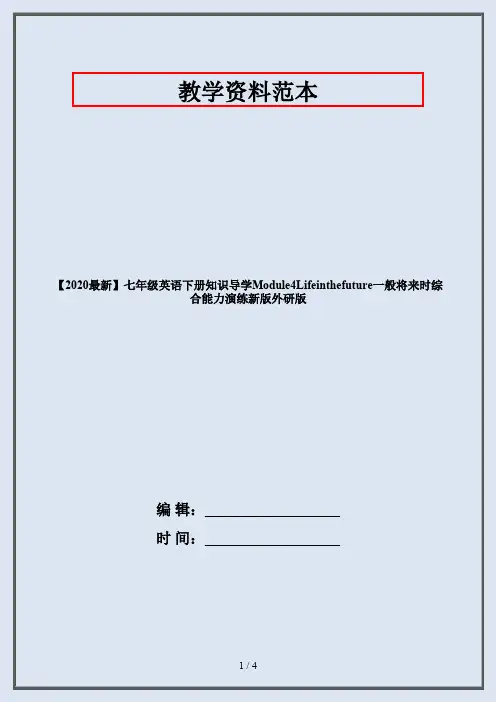
教学资料范本【2020最新】七年级英语下册知识导学Module4Lifeinthefuture一般将来时综合能力演练新版外研版编辑:__________________时间:__________________【巩固练习】I. 按要求改写下列各句。
1. We are going to play ping-pong on Saturday. (改为一般疑问句并作否定回答)— __________ __________ going to play ping-pong on Saturday?— __________, we __________.2. He’s going to tell me all about it. (改为否定句)He __________ __________ going to tell me all about it.3. She is going to work hard at English this term. (对划线部分提问) __________ she __________ __________ __________ this term?4. They’re going to the Sun Island by bus. (对划线部分提问)__________ __________they __________ __________ the Sun Island?5. The students of Class Three have a field trip on Sunday. (用next Sunday改写)The students of Class Three __________ __________ ____________________ a field trip next Sunday.6. Linda has lunch at school on Tuesday. (用next Tuesday改写)Linda __________ __________ __________ __________ lunch at school next Tuesday.7. I’ll go to join them.(改为否定句)I _______ go to join them.8. We will meet at the bus stop at 10:30.(改为一般疑问句)_______ ________ meet at the bus stop at 10:30?II. 把下列各句翻译成英语,每空一词。
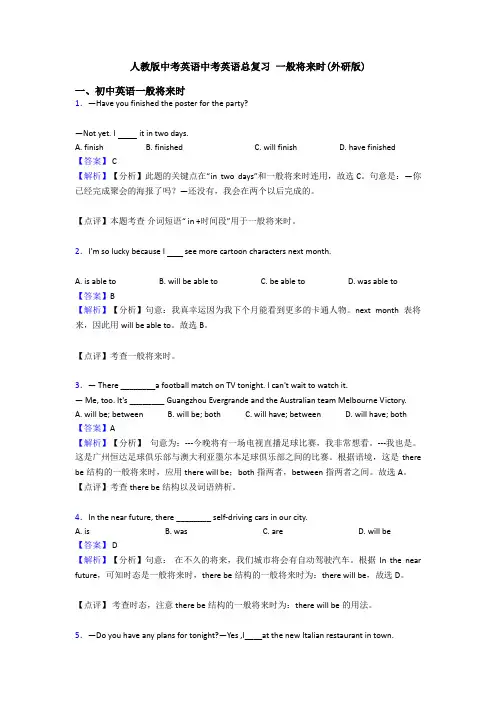
人教版中考英语中考英语总复习一般将来时(外研版)一、初中英语一般将来时1.—Have you finished the poster for the party?—Not yet. I it in two days.A. finishB. finishedC. will finishD. have finished【答案】 C【解析】【分析】此题的关键点在“in two days”和一般将来时连用,故选C。
句意是:—你已经完成聚会的海报了吗?—还没有,我会在两个以后完成的。
【点评】本题考查介词短语“ in +时间段”用于一般将来时。
2.I’m so lucky because I see more cartoon characters next month.A. is able toB. will be able toC. be able toD. was able to【答案】B【解析】【分析】句意:我真幸运因为我下个月能看到更多的卡通人物。
next month表将来,因此用will be able to。
故选B。
【点评】考查一般将来时。
3.— There ________a football match on TV tonight. I can't wait to watch it.— Me, too. It's ________ Guangzhou Evergrande and the Australian team Melbourne Victory.A. will be; betweenB. will be; bothC. will have; betweenD. will have; both【答案】A【解析】【分析】句意为:---今晚将有一场电视直播足球比赛,我非常想看。
---我也是。
这是广州恒达足球俱乐部与澳大利亚墨尔本足球俱乐部之间的比赛。
根据语境,这是there be结构的一般将来时,应用there will be;both指两者,between指两者之间。
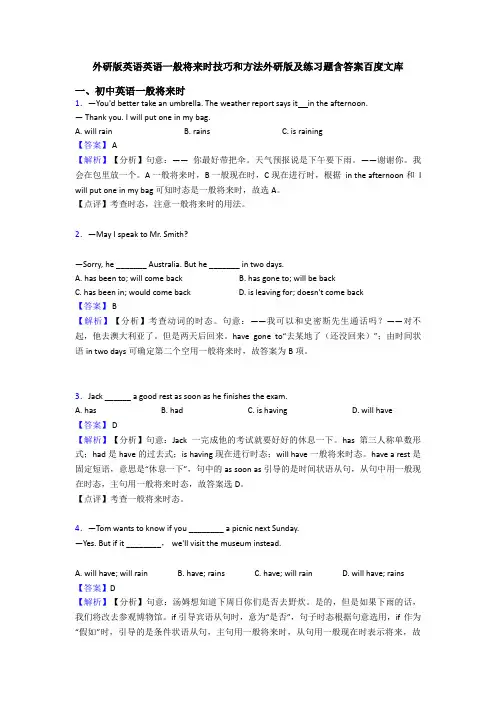
外研版英语英语一般将来时技巧和方法外研版及练习题含答案百度文库一、初中英语一般将来时1.—You'd better take an umbrella. The weather report says it in the afternoon.— Thank you. I will put one in my bag.A. will rainB. rainsC. is raining【答案】 A【解析】【分析】句意:——你最好带把伞。
天气预报说是下午要下雨。
——谢谢你。
我会在包里放一个。
A一般将来时,B一般现在时,C现在进行时,根据 in the afternoon和 I will put one in my bag 可知时态是一般将来时,故选A。
【点评】考查时态,注意一般将来时的用法。
2.—May I speak to Mr. Smith?—Sorry, he _______ Australia. But he _______ in two days.A. has been to; will come backB. has gone to; will be backC. has been in; would come backD. is leaving for; doesn't come back【答案】 B【解析】【分析】考查动词的时态。
句意:——我可以和史密斯先生通话吗?——对不起,他去澳大利亚了。
但是两天后回来。
have gone to“去某地了(还没回来)”;由时间状语in two days可确定第二个空用一般将来时,故答案为B项。
3.Jack ______ a good rest as soon as he finishes the exam.A. hasB. hadC. is havingD. will have【答案】 D【解析】【分析】句意:Jack一完成他的考试就要好好的休息一下。
外研版英语中考英语一般将来时技巧和方法外研版及练习题一、初中英语一般将来时1.Father's Day is coming. I'm thinking about ________.A. what present I gave himB. where shall we have a big mealC. how I will give him a surpriseD. if I planned a party for him【答案】 C【解析】【分析】句意:父亲节即将来临,我正在考虑怎样给他一个惊喜。
think about,考虑,后接宾语从句,宾语从句用陈述句语序,故排除B,根据 Father's Day is coming.可知正在考虑做的事情还没做,应用一般将来时,故排除AD,故选C。
【点评】考查宾语从句,注意宾语从句的语序和时态。
2.Susan and her sister ________ some photos in the park the day after tomorrow.A. takeB. tookC. will take【答案】 C【解析】【分析】句意:Susan和她的妹妹后天会在公园照一些照片。
根据时间状语the day after tomorrow,可知句子时态是一般将来时,一般将来时结构will+do,故选C。
【点评】此题考查一般将来时。
根据时间状语确定句子时态。
3.We ________ a party for Kate. It's supposed to be a surprise.A. were havingB. hadC. will haveD. have had【答案】C【解析】【分析】句意:我们将为凯特举办一个聚会。
这应该是个惊喜。
根据句意语境可知举办聚会这个动作还没有发生,需用一般将来时,故选C。
【点评】考查动词时态辨析题。
外研版英语中考英语一般将来时专项讲解及练习一、初中英语一般将来时1.Robots _____more heavy work for us in the future.A. will doB. didC. have doneD. were doing【答案】 A【解析】【分析】句意:在未来,机器人将为我们做更多繁重的工作。
根据in the future 可知此处用一般将来时,故选A。
【点评】考查时态的用法。
2.— There ________a football match on TV tonight. I can't wait to watch it.— Me, too. It's ________ Guangzhou Evergrande and the Australian team Melbourne Victory.A. will be; betweenB. will be; bothC. will have; betweenD. will have; both【答案】A【解析】【分析】句意为:---今晚将有一场电视直播足球比赛,我非常想看。
---我也是。
这是广州恒达足球俱乐部与澳大利亚墨尔本足球俱乐部之间的比赛。
根据语境,这是there be结构的一般将来时,应用there will be;both指两者,between指两者之间。
故选A。
【点评】考查there be结构以及词语辨析。
3.I don't know if he _____ tomorrow. If he _____, I'll go to see him.A. leaves; gets upB. will go; will goC. will come; comesD. is arriving; leaves【答案】 C【解析】【分析】我不知道明天他是否会来。
如果他来了,我会去看他。
结合语境可知前文是宾语从句,根据时间状语可知从句中描述的是将来的动作,故用一般将来时态。
一般将来时的导学案意义:1.表示将来某个时间要发生的动作或存在的状态,也表示将来经常或重复发生的动作,常与表示将来的时间状语连用。
tomorrow morning /afternoon/evening(明天早、中、晚);the day after tomorrow(后天);next year(明年);next month(下一个月);next week(下一个星期);soon(不久);later on过些时间;this afternoon(今天下午)in+段时间(in 2020 在2020年,in 15 year’s time15年后)2. 在一般将来时的句子中,有时有表示将来时间的状语,有时没有时间状语,这时要从意思上判断是否指未来的动作或情况。
例如:Will she come? 她(会)来吗?We’ll only stay for two weeks. 我们只待两星期。
The meeting won’t last long. 会开不了多久。
3.表征求对方的意见或邀请① Shall I /we …常用来征求对方意见.Shall we go to the park ?肯定Sure , let’s go . 否定No , let’s go to the cinema.②Will you…?问对方是否愿意,或者表示客气的邀请.Will you please come to my birthday party next week ?肯定Yes, I will. / Sure . 否定I’m sorry. I’m afraid I can’t.一、用所给动词的一般将来时填空1. I ______(leave)in a minute. I ______(finish)all my work before I ______ (leave).2. I ______(be)tired. I ______(go)to bed early tonight.3. Mary’s birthday is next Monday, her mother _____(give)her a present.4. It is very cold these days. It ______(snow)soon.5. —_____ you _____(be)here this Saturday? —No. I ______(visit)my teacher.6. —______ I ______(get)you a copy of today’s newspaper? —Thank you.7. I am afraid there ______(be)a meeting this afternoon. I can’t join you.8. Mike ______(believe, not)this until he ______(see)it with his own eyes.9. Most of us don’t think their team ______(win).二、单项选择1. There __________ a meeting tomorrow afternoon.A. will be going toB. will going to beC. is going to beD. will go to be2. Charlie ________ here next month.A. isn’t workingB. doesn’t workingC. isn’t going to workingD. won’t work3. He ________ very busy this week, he ________ free next week.A. will be; isB. is; isC. will be; will beD. is; will be4. There ________ a dolphin show in the zoo tomorrow evening.A. wasB. is going to haveC. will haveD. is going to be5. –________ you ________ free tomorrow?– No. I ________ free the day after tomorrow.A. Are; going to; willB. Are; going to be; willC. Are; going to; will beD. Are; going to be; will be三、把下列各句译成英语1.我叔叔今晚要来。
Module 4 —一般将来时【概念引入】一般将来时表示将来某个时间要发生的动作或存在的状态,将来经常或反复发生的动作,常与表示将来的时间状语连用。
如:tomorrow , tomorrow morning / afternoon …,the day after tomorrow , next year , next month … , from now on (从现在开始),in an hour (一小时后),in two days / weeks …等。
例如:What are you going to do next Sunday ?下周日你打算做什么?The American basketball team will arrive in Beijing tomorrow.美国篮球队明天要到北京。
【语法讲解】1. be going to+动词原形结构(1)表示主体现在的意图,即打算在最近或将来要做某事,主语通常指人。
在被动结构中,主语也可指物,但动作的执行者仍然是人。
例如:We are going to have a class meeting this afternoon. 今天下午我们打算开班会。
She’s going to be a teacher. 她打算作一名教师。
The wall is going to be brushed white. 墙要被刷成白色的。
(2)表示主观判断客观上要发生的事,或根据目前的迹象或预测很可能要发生的事。
例如:Look at the black clouds. It’s going to rain. 看那些乌云,快要下雨了。
Don’t go out. It is going to rain. 不要出去,要下雨了。
(3) there be句型可以与be going to 结构连用。
例如:There is going to be a football match on TV this evening.今晚电视上有一场足球比赛。
2020中考英语:一般将来时一般将来时一.意义:1.表示将来某个时间要发生的动作或存在的状态,也表示将来经常或重复发生的动作,常与表示将来的时间状语连用。
tomorrow morning /afternoon/evening(明天早、中、晚);the day after tomorrow(后天);next year(明年);next month(下一个月);next week(下一个星期);soon(不久);later on 过些时间;this afternoon(今天下午)in+段时间( in 2020 在2020年,in 15 year’s time15年后)2. 在一般将来时的句子中,有时有表示将来时间的状语,有时没有时间状语,这时要从意思上判断是否指未来的动作或情况。
例如:Will she come? 她(会)来吗?We’ll only stay for two weeks. 我们只待两星期。
The meeting won’t last long. 会开不了多久。
3.表征求对方的意见或邀请① Shall I /we …常用来征求对方意见.Shall we go to the park ?肯定Sure , let’s go . 否定No , let’s go to the cinema.②Will you…?问对方是否愿意,或者表示客气的邀请.Will you please come to my birthday party next week ?肯定Yes, I will. / Sure . 否定I’m sorry. I’m afraid I can’t.二. 构成及变化一般将来时常用的两种结构(一)be going to+ do : 表示打算、准备做的事或即将发生或肯定要发生的事。
be going to +动词原形1.肯定句:主语+ be(am /,is,/ are) going to +动词原形+其它成份My sister is going to learn English next year. 我姐姐准备明年学英语。
2.否定句:主语+be(am / is / are)not going to +动词原形 +其它成份I am not going to(go to)the cinema tonight. 我今天晚上不打算去看电影。
3.一般疑问句:Be (am / is / are)+主语+going to+动词原型+其它成份…?Is your father going to play basketball with you ? No , he isn’t.你父亲打算和你去打篮球吗?不。
4.特殊疑问句:特殊疑问词(Wh-)+一般疑问句 ?Where are you going to spend Spring Fesital.? 春节你打算在哪过?shall/will+do : 表示将要发生的动作或情况,没有太多的计划性, 还用来表示意愿will /shall +动词原形 (在书面语中,主语是第一人称时,常用shall ,在口语中,所有人称都可以用will)1.肯定句:主语+will/shall+动词原形+其它成份I (shall) write to him next week. 下周我将给他写信。
2.否定句:主语 + will /shall+ not + 动词原形 +其它成份They won’t watch TV this evening.今天晚上他们不看电视。
3.一般疑问句:will/shall+主语 +动词原形+其它成份Will you stay at home with us tomorrow ?明天你和我们呆在家里好吗?4.特殊疑问句:特殊疑问词(Wh-) +一般疑问句When will your father be back? 你爸爸什么时侯回来?三.be going to与will的区别1.用be going to的情况有a.表示打算、准备做的事。
例如:We are going to put up a building here.我们打算在这里盖一座楼。
How are you going to spend your holidays?假期你准备怎样过?b.表示即将发生或肯定要发生的事。
例如:I think it is going to snow. 我看要下雪了。
There’s going to be a lot of trouble about this. 这事肯定会有很多麻烦。
2.用will时表示客观难以改变的事实,(1).It will rain tomorrow。
明天将要下雨.(2).It will be Teachers' Day the day after tomorrow.后天将是教师节.(3).My birthday will come.我生日将要到了.四.用现在进行时表示将来的动词go,come,leave,arrive ,start等.(1)She is coming here tomorrow.她明天将要来这儿.(2).When are you leaving here?你什么时间将要离开这儿?一、用所给动词的一般将来时填空1. I ______(leave)in a minute. I ______(finish)all my work before I ______ (leave).2. I ______(be)tired. I ______(go)to bed early tonight.3. Mary’s birthday is next Monday, her mother _____(give)her a present.4. It is very cold these days. It ______(snow)soon.5. —_____ you _____(be)here this Saturday? —No. I ______(visit)my teacher.6. —______ I ______(get)you a copy of today’s newspaper? —Thank you.7. I am afraid there ______(be)a meeting this afternoon. I can’t join you.8. Mike ______(believe, not)this until he ______(see)it with his own eyes.9. Most of us don’t think their team ______(win).二、单项选择1. There __________ a meeting tomorrow afternoon.A. will be going toB. will going to beC. is going to beD. will go to be2. Charlie ________ here next month.A. isn’t workingB. doesn’t workingC. isn’t going to workingD. won’t work3. He ________ very busy this week, he ________ free next week.A. will be; isB. is; isC. will be; will beD. is; will be4. There ________ a dolphin show in the zoo tomorrow evening.A. wasB. is going to haveC. will haveD. is going to be5. –________ you ________ free tomorrow?–No. I ________ free the day after tomorrow.A. Are; going to; willB. Are; going to be; willC. Are; going to; will beD. Are; going to be; will be6. Mother ______me a nice present on my next birthday.A. will givesB. will giveC. givesD. give7. – Shall I buy a cup of tea for you?–________. (不,不要。
)A. No, you won’tB. No, you aren’t.C. No, please don’tD. No, please.8. – Where is the morning paper?– I ________ it for you at once.A. getB. am gettingC. to getD. will get9. ________ a concert next Saturday?A. There will beB. Will there beC. There can beD. There are10. If they come, we ________ a meeting.A. haveB. will haveC. hadD. would have11. He ________ her a beautiful hat on her next birthday.A. givesB. gaveC. will givingD. is going to give12. He ________ to us as soon as he gets there.A. writesB. has writtenC. will writeD. wrote13. He ________ in three days.A. coming backB. came backC. will come backD. is going to coming back14. If it ________ tomorrow, we’ll go roller-skating.A. isn’t rainB. won’t rainC. doesn’t rainD. doesn’t fine15. – Will his parents go to see the Terra Cotta Warriors tomorrow?– No, ________ (不去).A. they willn’tB. they won’t.C. they aren’tD. they don’t.16. Who ________ we ________ swimming with tomorrow afternoon?A. will; goB. do; goC. will; goingD. shall; go17. We ________ the work this way next time.A. doB. will doC. going to doD. will doing18. Tomorrow he ________ a kite in the open air first, and then ________ boating in the park.A. will fly; will goB. will fly; goesC. is going to fly; will goesD. flies; will go19. The day after tomorrow they ________ a volleyball match.A. will watchingB. watchesC. is watchingD. is going to watch20. There ________ a birthday party this Sunday.A. shall beB. will beC. shall going to beD. will going to be21. They ________ an English evening next Sunday.A. are havingB. are going to haveC. will havingD. is going to have22. ________ you ________ free next Sunday?A. Will; areB. Will; beC. Do; beD. Are; be23. He ________ there at ten tomorrow morning.A. willB. isC. will beD. be24. ________ your brother ________ a magazine from the library?A. Are; going to borrowB. Is; going to borrowC. Will; borrowsD. Are; going to borrows25. – Shall I come again tomorrow afternoon?–________ (好的).A. Yes, pleaseB. Yes, you will.C. No, pleaseD. No, you won’t.26. It ________ the year of the horse next year.A. is going to beB. is going toC. will beD. will is27. ________ open the window?A. Will you pleaseB. Please will youC. You pleaseD. Do you28. –Let’s go out to play football, shall we?– OK. I ________.A. will comingB. be going to comeC. comeD. am coming29. It ________ us a long time to learn English well.A. takesB. will takeC. spendsD. will spend30. The train ________ at 11 .A. going to arriveB. will be arriveC. is going toD. is arriving三、把下列各句译成英语1.我叔叔今晚要来。